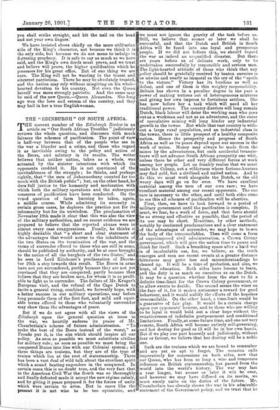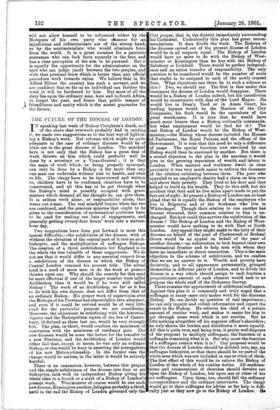THE " EDINBURGH " ON SOUTH AFRICA.
THE current number of the Edinburgh Ream in an article on "Our South African Troubles" judiciously reviews the whole question, and discusses with much fairness the schemes of pacification. The point of view is half-way between that of the people who see in the war a blunder and a crime, and those who regard it as inevitable owing to the policy and action of the Boers, and salutary in its results. The writer believes that neither nation, taken as a whole, was actuated by the sinister intentions with which its opponents credited it. He is not convinced of the inevitableness of the struggle ; be thinks, and perhaps rightly, that " the men of Johannesburg counted far too much with the British public" ; but, on the other hand, he does full justice to the humanity and moderation with which both the military operations and the subsequent measures of pacification have been conducted. On the vexed question of farm burning he takes, again, a middle course. While admitting its necessity in certain gross cases, he deplores the practice not for its inhumanity but for its unwisdom. The proclamation of November 18th made it clear that this was also the view of the military authorities, and on recent evidence we are prepared to believe that the reported abuses were in almost every case exaggerations. Finally, he thinks it highly desirable that "a short and clear statement of the advantages that would accrue to the inhabitants of the two States on the termination of the war, and the terms of surrender offered to those who are still in arms, should be published by authority, and be at once brought to the notice of all the burghers of the two States," and he sees in Lord Kitchener's proclamation of Decem- ber 20th a step towards this result. The Boers in arms have not yet surrendered, partly because they are not yet convinced that they are conquered, partly because they believe that they are broken men, for whom it is as profit- able to fight as to surrender. The failure of Mr. Kruger's European visit, and the refusal of the Cape Dutch to incite a general rising, combined, we fervently hope, with a better success in our military operations, may before long persuade them of the first fact, and mild and equit- able terms offered to those who voluntarily surrrender may show them the advantages of peace.
But if we do not agree with all the views of the Edinburgh upon the general question at issue in the war, we heartily endorse its praise of Mr. Chamberlain's scheme of future administration. "To make the best of the Boers instead of the worst," as Fronde put it, is the aim which should inspire all our policy. As soon as possible we must substitute civilian for military rule; as soon as possible we must bring the conquered States into line with our Colonial system ; all these things are truisms, but they are of the type of truism which lies at the root of statesmanship. There has been a vast deal of wild talk about the excellent spirit which a sound beating engenders in the conquered. In certain cases this is no doubt true, and the very fact that in the American Civil War the South was so thoroughly and finally defeated made it accept the new regime calmly, and by giving it peace prepared it for the forces of unity which were certain to arise. But in cases like the present it is not wise to be too optimistic, and we must not ignore the gravity of the task before us. Still, we believe that sooner or later we shall be successful, and that the Dutch and British in South Africa will be fused into one loyal and prosperous people. If we did not believe this, we should regard the war as indeed an unqualified disaster. But there are years before us of delicate work, only to be undertaken successfully by responsible and serious men. The light-hearted attitude of those who think that any policy should be gratefully received by beaten enemies is as unwise and nearly as immoral as the cry of the "spoils to the victors." Victory has its burdens as well as defeat, and one of them is this weighty responsibility. Britain has shown in a. peculiar degree in the past a power of making nations out of heterogeneous mixtures and giving her own impress to fortuitous settlers. She has now before her a task which will need all her traditional power. The country districts will long remain Dutch, black labour will deter the working man who goes out as a workman and not as an adventurer, and the curse of speculative mining will long hinder any industrial growth in the towns. But while that vast country is with- out a large rural population, and an industrial class in the towns, there is little prospect of a healthy composite nation. Hence the prosperity and progress of South Africa as well as its peace depend upon our success in the work of union. Money may always be made from the mines by the adventurous, but such accidental treasure- trove will not advance South African prosperity one whit. unless there be other and very different forces at work among her people. Let us frankly realise that we must make the Colony, not a wilderness where fortune-hunters may find gold, but a civilised and united nation. And to do this we must work alongside the Dutch, or the old weary days will go on for ever. We have excellent material among the men of our own race; we have excellent material among our recent opponents. The one race is necessary to the other, and until both sides come to see this all schemes of pacification will be abortive.
First, then, we have to look forward to a period of military government until the pacification is complete. It must, we fear, be a work of force, and that force should be as strong and effective as possible, that the period of its use may be short. Meantime, by other methods, notably by continued proclamations and a clear statement of the advantages of surrender, we may hope to lessen the body of the irreconcilablee. Then will come a form of superimposed civil administration, a Crown Colony government, which will give the nation time to pause and think for itself. Such a breathing space after a hard war is of incalculable use, for, we believe, as the truth emerges and men see recent events at a greater distance bitterness may grow less and misunderstandings be cleared up. It will be a time of probation, and also, we hope, of education. Both sides have lessons to learn, and the duty is as much on ourselves as on the Dutch. It may be a question whether from the start to fix a definite time-limit for the Crown Colony government, or to allow events to decide. The second seems the wiser on the face of it, for it makes autonomy a reward for good behaviour, and it would nullify the efforts of the hopeless irreconcilable. On the other hand, a time-limit would be a guarantee of fair play. It would be a certain charge upon our opponents' honour, and to those who are willing to be loyal it would hold out a clear hope without the vexatiousness of indefinite postponement and conditional limitations. Finally,at some future time, and one not very remote, South Africa will become entirely self-governing, and her destiny for good or ill will be in her own hands. But if we play our part honestly and judiciously, without fear or favour, we believe that her destiny will be a noble one.
Such are the truisms which we are bound to remember and are yet so apt to forget. The occasion calls imperatively for concessions on both sides, now that our Queen, who has been so long a wise and temperate influence on British statesmanship, has passed from the world into the world's history. The war may last a year longer, but sooner or later it will be over. and however we may have differed on its merits, we must surely unite on the duties of the future. Mr. Chamberlain has already shown the way in his admirable statement of the Government policy, and we trust that he will not allow himself to be influenced either by the Hotspurs of his own party who clamour for an injudicious and indiscriminate use of the strong hand, or by the sentimentalists who would eliminate force from the world. It is a great occasion for a patriotic statesman who can look facts squarely in the face, and has a clear perception of the aim to be pursued. But it is equally the opportunity for the administrator on the spot who can judge justly between the two peoples, And with that personal force which is better than any official procedure work towards union. We believe that in Sir Alfred Milner the country has such a servant, and we are confident that so far as an individual can further the work it will be furthered by him. But most of all the duty lies upon the ordinary man, here and in South Africa, to forget the past, and foster that public temper of friendliness and sanity which is the surest guarantee for the future.



















































 Previous page
Previous page